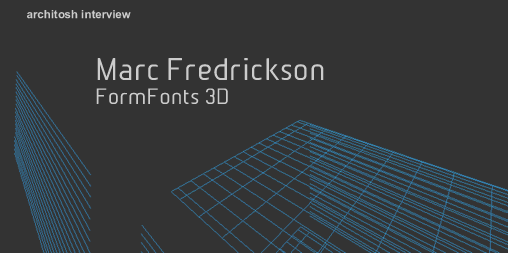Continued from page 1
Yes. After leaving Rockstar Games, I built my own house acting as the general contractor. I designed the house using SketchUp and FormFonts content. Using the digital model, my wife and I knew what we’d be building before we started construction. Construction details may have changed here and there, but the overall look and feel is the same as in the SketchUp model.
At the time when I was looking for a new work adventure, Fred approached me about joining up with FormFonts. I saw it as a great opportunity to incorporate the skills and knowledge learned in the worlds of architecture and video game production as well as to learn new things and explore new areas.
What is the driving motivation behind Form Fonts 3D?
(MF): There are two main ideas. First, the name says a lot about it. ‘Form’ is the 3D part and ‘Fonts’ comes from Ascii. The goal is to some day have graphic styles (font types) as easily interchangeable as changing the font in a text document. The model/object would be nothing more than a representation of the thing, the platonic chair. The style/look/rendering of the chair can be anything. As in a text document every letter can be a different font so in a representation of a built environment, every object can have it unique style and rendered look.
Secondly there’s the idea of Smart Objects or Intelligent Objects for BIM (Building information Modeling.) In order for BIM to work, the models need to have information embedded into them.
For the time being we’re focusing on providing quality models at a great price while we work toward our underlying goals.
Who is your ideal customer and what do they gain by using your service?
(MF): People who love to get lost in creating beautiful things. More specifically, this would be designers in many fields: from architecture, stage design, film production, comic books, construction planning, graphic designers and those that need to represent the real world.
A subscriber gains access to thousands of high quality, low polygon models as well as textures. Instead of taking the hours required to model the 3D entourage and building products, a model can be downloaded from our growing library. Being a web-based subscription service, a customer can download what they want, try it out, and then try out another without having to pay for each individual model.
And being a pay-for service, a subscriber doesn’t have to worry about the quality as opposed to much of the free content on the web. Subscribers can also request models to be made should we not already have what they’re looking for. We like the requests because the subscriber is more likely to ask for something needed by many — as opposed to us guessing what people may need.
You offer your 3D models in particular in several different file formats. How did you settle on these? Is this choice primarily customer-driven and if not then how do you decide which formats to create in?
(MF): As the site has its origins in SketchUp, it is our main file format. We’ve added and removed formats over the years based on what the subscribers are requesting and downloading. We’re currently supporting SketchUp, ArchiCAD, Revit, DWG, 3ds and Collada.
What is the most popular file format?







Reader Comments
Comments for this story are closed